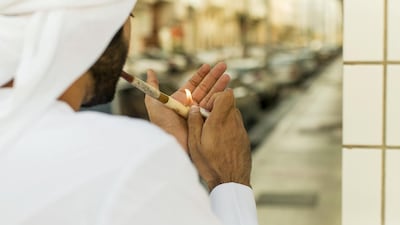Excise tax was introduced across the country on October 1 in a bid to diversify the Government’s revenue streams and discourage the consumption of products that harmed the environment and public health. One week after the ‘sin tax’ took effect, The National visited tobacconists and supermarkets to assess the effects the federal tax has had on consumers and trade.
When Abdulla Jabri heard of the excise tax, he filled his cupboards with enough dokha tobacco to last a year. “One week ago I spent Dh1,000, eight bottles,” said the 23-year-old from Al Ain. “Now my storage is full. So for one year, no problem.”
Days after the tax was introduced, dokha suppliers said they had still not been informed whether or not the tax applied to their brands. At half a dozen tobacco shops in Abu Dhabi visited by The National on Wednesday, dokha prices remain unchanged.
“We are waiting for some kind of information from the government to know whether the tax has been implemented on our product or not,” Rayaz Ahmad, the marketing manager of Abu Mohammed Smoking Accessories. “I’m checking the website every day. I tried to register by mail but I have not received any confirmation from them.”
Dokha, crushed tobacco smoked through a slender pipe, was once sold in unbranded vials but, over the last 10 years, local brands have become household names. Abu Mohammed sells and distributes 24 different blends under their brand, Fadayee. With branches in Dubai, Al Ain, Ras Al Khaimah and Muscat, it is one of three major dokha companies that dominates the market.
Only one brand of dokha, Scorpion, appears on the government list of goods subject to the excise tax.
_______________
Excise tax: one week on
Northern Emirates retailers yet to determine cigarette tax impact due to supply shortage
Dubai supermarkets left short on stock after tax led sales surge
Youngsters in Sharjah defiant on fizzy drink consumption despite price hike
_______________
“The list which I can see on their website is carbonated drinks, energy drinks, shisha but dokha is not mentioned,” said Mr Ahmad. “That’s why we are waiting for any kind of message from the government so that we can proceed further.”
Tobacconist Mohammed Al Zoubi is hoping that dokha will make up for his loss in cigarettes and shisha sales, both of which are subject to the 100 per cent tax.
Mr Al Zoubi was a former smoker who switched to dokha because it is less expensive and has no additives, although it is still a carcinogen. He’s hoping others will do the same.
When the young Syrian opened his tobacco shop in Abu Dhabi four months ago, it seemed like a sure bet.
His cigarette and shisha sales have slowed in recent days but he’s had five to 10 new dokha customers a day since the tax came into effect on Sunday.
“Any customers smoking cigarettes, now they’ll smoke dokha,” said Mr Al Zoubi, 28. “It’s the same as tobacco. Even if there are taxes on dokha, it will still be a reasonable price.
“People can’t spend Dh1,000 a month on cigarettes. Look,” he said, pulling out a calculator. “If it’s Dh40 for a pack that’s 1,200 a month.”
One of Mr Al Zoubi’s suppliers increased prices for a 13.5mg bottle of dokha from Dh25 to Dh40 this week. He speculated this was a play on consumer expectations.
Initiatives to decrease dokha consumption have not stopped its growing popularity among young men. One such initiative requires dokha be packaged and labelled with warnings of associated health risks but it not only failed to dissuade smokers, vendors said it improved sales by assuring smokers of consistent quality.
Mr Ahmad could not provide sales figures but estimated that sales have easily doubled in the last 10 years. Pipes, once made of wood and costing no more than Dh15, are now carved from horn or studded with rhinestones. At Abu Mohammed, a carbon fibre pipe with the weight and feel of a Mont Blanc pen sells for Dh650.
“Your mobile, your wallet and the pipe, this is something luxurious in your hand,” said Mr Ahmad. “People come because of the brand.”
_______________
Read more:
It’s all too easy for teens to buy dokha
High prices and low stocks hit UAE's ardent smokers
_______________
While the jury’s still out on tax on dokha, shisha and cigarette smokers are out of luck.
Hamdan Al Nuaimi likes to smoke double apple shisha on his yacht but his favourite brand has disappeared from markets after distributors cut supplies in the last week of September.
Speaking to a clerk at Bin Khumery Smoking Goods, he rattled off a list of shops he had visited in search of his favourite brand.
“Nobody has it and I’ve only smoked Al Nakhla brand for 17 years,” said Mr Al Nuaimi, 36.
Select shisha cafes in Khalidiya had increased their prices but others had not.
Cigarette shelves at balaqas across the capital got emptier as the week progressed and new stock failed to arrive.
At Al Nada Baqala, Ranjith Rathnan bought one of the last packs on the shelf. “What to do? I have to smoke, no?” he said.
He did not pick up the habit until he moved to the UAE, in part because of the price in his homeland but the new tax has made him think twice. “In our country, Sri Lanka, one package is 1,000 rupees,” said Mr Rathnan, 45, who smokes three or four cigarettes a day. “That’s Dh25.”

